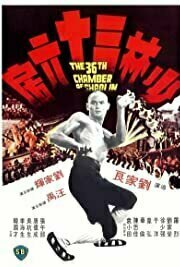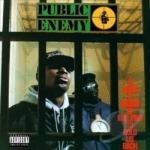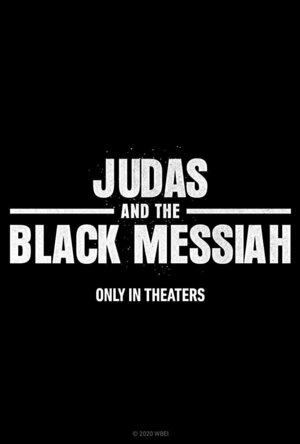Search
Search results
Rick Nielsen recommended The 36th Chamber of Shaolin (1978) in Movies (curated)
Alex Kapranos recommended It Takes a Nation of Millions to Hold Us Back by Public Enemy in Music (curated)
Gareth von Kallenbach (965 KP) rated Judas and the Black Messiah (2021) in Movies
Feb 2, 2021
Racism has all too often reared its ugly head in recent years with the rise of extremist groups who felt emboldened by recent political climates. As violence leads to protests which can themselves become violent; the perpetual cycle seems unending.
In the new film “Judas and the Black Messiah”, audiences are told the real-life story of Fred Hampton (Daniel Kaluuya) who runs a local chapter of The Black Panthers in Illinois in the 1960s.
The rise of what is perceived as militant groups in the wake of the killings of Malcolm X and Dr. Martin Luther King has caused increased police and Federal actions which have caused many in Hampton’s community to feel they are at war with the authorities and fighting for their very survival against a system of injustice and systemic racism.
When car thief William O’Neal is arrested, FBI agent Roy Mitchell (Jesse Plemons); offers O’Neal a chance to avoid prison and earn some money by becoming an informant. Despite his reservations; O’Neal works his way into Hampton’s inner circle and develops a friendship with the man as he learns of his plans to unify the various factions in their communities.
O’Neal sees how there is more to the Black Panthers as they feed, educate, and assist members of their community and work to contain more extreme elements that look to make statements through bombings and extreme actions.
The threat posed by Hampton draws the attention of FBI Director J Edgar Hoover (Martin Sheen), and plans are developed to take down Hampton and his organization which in turn puts even more pressure on Mitchell and O’Neal.
The movie is a gripping, disturbing, and sure to be controversial look into the lives of the key figures as well as the ongoing debates on racial injustice, police violence, hate groups, and violence in the community.
Director Shaka King attempts to find a balance in the film as there are moments where party members draw their weapons against the police and kill wounded officers. There are also numerous scenes where police beat and shoot unarmed individuals or use excessive force which underscores Hampton’s stance that his community is at war and this is a life or death struggle.
The last time I was so disturbed by a film of this genre was “Detroit” which shocked me with the horrific true crimes that were portrayed and how those involved escaped justice. I thought if as a Caucasian I could be so disturbed and disgusted by the terrifying events portrayed in the film; then they would be truly the stuff of nightmares for people of color.
The cast is very strong and gives memorable performances that show the complexity of their characters. They are not simply a militant and a snitch, but rather complex individuals trying to survive.
“Judas and the Black Messiah” is a very well-crafted film that is equally informative and disturbing and does what good cinema does best; educate, entertain, and inform.
4.5 stars out of 5
In the new film “Judas and the Black Messiah”, audiences are told the real-life story of Fred Hampton (Daniel Kaluuya) who runs a local chapter of The Black Panthers in Illinois in the 1960s.
The rise of what is perceived as militant groups in the wake of the killings of Malcolm X and Dr. Martin Luther King has caused increased police and Federal actions which have caused many in Hampton’s community to feel they are at war with the authorities and fighting for their very survival against a system of injustice and systemic racism.
When car thief William O’Neal is arrested, FBI agent Roy Mitchell (Jesse Plemons); offers O’Neal a chance to avoid prison and earn some money by becoming an informant. Despite his reservations; O’Neal works his way into Hampton’s inner circle and develops a friendship with the man as he learns of his plans to unify the various factions in their communities.
O’Neal sees how there is more to the Black Panthers as they feed, educate, and assist members of their community and work to contain more extreme elements that look to make statements through bombings and extreme actions.
The threat posed by Hampton draws the attention of FBI Director J Edgar Hoover (Martin Sheen), and plans are developed to take down Hampton and his organization which in turn puts even more pressure on Mitchell and O’Neal.
The movie is a gripping, disturbing, and sure to be controversial look into the lives of the key figures as well as the ongoing debates on racial injustice, police violence, hate groups, and violence in the community.
Director Shaka King attempts to find a balance in the film as there are moments where party members draw their weapons against the police and kill wounded officers. There are also numerous scenes where police beat and shoot unarmed individuals or use excessive force which underscores Hampton’s stance that his community is at war and this is a life or death struggle.
The last time I was so disturbed by a film of this genre was “Detroit” which shocked me with the horrific true crimes that were portrayed and how those involved escaped justice. I thought if as a Caucasian I could be so disturbed and disgusted by the terrifying events portrayed in the film; then they would be truly the stuff of nightmares for people of color.
The cast is very strong and gives memorable performances that show the complexity of their characters. They are not simply a militant and a snitch, but rather complex individuals trying to survive.
“Judas and the Black Messiah” is a very well-crafted film that is equally informative and disturbing and does what good cinema does best; educate, entertain, and inform.
4.5 stars out of 5
Cody Cook (8 KP) rated A Black Theology of Liberation in Books
Jun 29, 2018
James Cone is considered to be the founder of Black Liberation Theology, a variant of the Liberation Theology movement most widely connected with South American theologian Gustavo Gutierrez. Liberation Theology emphasizes those biblical concerns that white European flavored Christianity has often looked over– concerns like justice and liberation for the oppressed and downtrodden (Luke 4:16-21, Matthew 25:31-45, etc.). Though these emphases are quite important, in Liberation movements, they can often drown out other, extremely vital, elements of the Christian faith, as they clearly do in Cone’s Black Liberation Theology.
One major issue for Cone is one of authority. The experience of one group of people (the oppressed) becomes equivalent with universal truth, and not simply an important concern in Christian theology. In other words, Cone makes his own experience the judge of who God is and what God is for. While “white” (a term used by Cone not so much to reflect skin color but an oppressor mentality) Christianity commits this grave error without realizing it, Cone does so with full knowledge. So, for instance, while a conservative “white” theologian would say that his own views and actions *should* be directed by the scripture (whether or not he does in fact direct them by this standard), Cone makes the judgement of the oppressed black community the ultimate truth for them– and if mass violence against whites is decided by the group as the best means to effect their liberation, so be it. Cone explicitly distances himself from the approach of King, identifying more with the violence-prone philosophy of the Nation of Islam as propounded by Malcolm X. If someone criticizes his approach, he seems to assume that they’re doing so as a “white” oppressor and should be ignored– an oppressor has no moral right to question the rightness or wrongness of the actions of the people he is oppressing. This of course ignores the criticisms of violence, even from the oppressed, of black Christians like Martin Luther King Jr., Desmond Tutu, etc. Cone is also unfortunately either unfamiliar with or unconvinced by pacifist Christian claims to be committed to peaceful action, since he equates non-violence with inaction and acquiescence. While he is absolutely correct in seeing liberation as an important theme in the Christian faith, he, like “white” religionists, allows his own experience and emotions to determine what is right and wrong to the point of supporting evil in the interest of what he feels is best for his community. However, what can’t be said of Cone’s position on violence is that it is radical, because it is emphatically not. The political heroes of most white Americans are men who used violence to gain political autonomy. Thus, it is not radical for black men and women to look up to figures like Malcolm X and James Cone who advocate doing the same thing if it seems necessary for freedom and self-determination; it is merely status quo. The problem is that Jesus calls all men and women, regardless of color, to rise above the status quo and the myth of redemptive violence.
Seizing on that point, one major problem with Cone’s view of violent revolution is that when oppressed people rise up through violence, they become the oppressor– co-opting the tools of oppression and dehumanization. “Blacks” become “white” through the use of violence. Cone seems unaware of (doubtful) or unaffected by the history of the Bolshevik, Cuban, or French revolutions, wherein the oppressed quickly became the oppressors and became twofold more a child of hell than their oppressors. His view also reshapes Nat Turner, the slave who claimed to have been directed by God to murder white women and children, into an unqualified hero. Cone’s system re-establishes and re-affirms oppression– it does not end it.
For Cone, God is black and the devil is white, because God supports the oppressed and the devil supports the oppressor. But in so closely identifying God with blackness, the actions of those in the black community are now above being questioned, just like the actions of white enslavers were, according to them, above being questioned because they aligned themselves with God and those whom they oppressed with the devil.
What Cone is really trying to get at is that since Jesus supports the cause of the oppressed, the oppressor must so distance himself from his oppressor identity that he becomes indistinguishable from the oppressed– willing to suffer along with them– if he is to be Christ-like. In other words, the “white” must become “black.” Cone says that God can’t be colorless where people suffer for their color. So, where blacks suffer God is black. Taking this logic, which is indeed rooted in Scripture, where the poor suffer, God is poor. Where babies are killed in the womb, God is an aborted baby. Where gay people are bullied, God is gay. It is our obligation to identify with the downtrodden, because that’s what Jesus did. Paul, quoting a hymn of the church about Jesus, puts it this way:
“In your relationships with one another, have the same mindset as Christ Jesus:
‘Who, being in very nature God,
did not consider equality with God something to be used to his own advantage;
rather, he made himself nothing
by taking the very nature of a servant,
being made in human likeness.
And being found in appearance as a man,
he humbled himself
by becoming obedient to death—
even death on a cross!'”
–Philippians 2:5-8
Jesus not only gives up his power to express love to the powerless by identifying with them, He also takes on their sin and suffers with and for them. This is the essence of the gospel, and it often gets lost when we translate it into our daily lives. For Cone, this important truth gets lost in the banner of black militantism and the cycle of violence. For so many American Christians, it gets lost when they reduce the political nature of Christianity to scolding those whose private expression of morality doesn’t line up with theirs. We refuse to identify with sinners (which is a category we all fit into) in love.
One major issue for Cone is one of authority. The experience of one group of people (the oppressed) becomes equivalent with universal truth, and not simply an important concern in Christian theology. In other words, Cone makes his own experience the judge of who God is and what God is for. While “white” (a term used by Cone not so much to reflect skin color but an oppressor mentality) Christianity commits this grave error without realizing it, Cone does so with full knowledge. So, for instance, while a conservative “white” theologian would say that his own views and actions *should* be directed by the scripture (whether or not he does in fact direct them by this standard), Cone makes the judgement of the oppressed black community the ultimate truth for them– and if mass violence against whites is decided by the group as the best means to effect their liberation, so be it. Cone explicitly distances himself from the approach of King, identifying more with the violence-prone philosophy of the Nation of Islam as propounded by Malcolm X. If someone criticizes his approach, he seems to assume that they’re doing so as a “white” oppressor and should be ignored– an oppressor has no moral right to question the rightness or wrongness of the actions of the people he is oppressing. This of course ignores the criticisms of violence, even from the oppressed, of black Christians like Martin Luther King Jr., Desmond Tutu, etc. Cone is also unfortunately either unfamiliar with or unconvinced by pacifist Christian claims to be committed to peaceful action, since he equates non-violence with inaction and acquiescence. While he is absolutely correct in seeing liberation as an important theme in the Christian faith, he, like “white” religionists, allows his own experience and emotions to determine what is right and wrong to the point of supporting evil in the interest of what he feels is best for his community. However, what can’t be said of Cone’s position on violence is that it is radical, because it is emphatically not. The political heroes of most white Americans are men who used violence to gain political autonomy. Thus, it is not radical for black men and women to look up to figures like Malcolm X and James Cone who advocate doing the same thing if it seems necessary for freedom and self-determination; it is merely status quo. The problem is that Jesus calls all men and women, regardless of color, to rise above the status quo and the myth of redemptive violence.
Seizing on that point, one major problem with Cone’s view of violent revolution is that when oppressed people rise up through violence, they become the oppressor– co-opting the tools of oppression and dehumanization. “Blacks” become “white” through the use of violence. Cone seems unaware of (doubtful) or unaffected by the history of the Bolshevik, Cuban, or French revolutions, wherein the oppressed quickly became the oppressors and became twofold more a child of hell than their oppressors. His view also reshapes Nat Turner, the slave who claimed to have been directed by God to murder white women and children, into an unqualified hero. Cone’s system re-establishes and re-affirms oppression– it does not end it.
For Cone, God is black and the devil is white, because God supports the oppressed and the devil supports the oppressor. But in so closely identifying God with blackness, the actions of those in the black community are now above being questioned, just like the actions of white enslavers were, according to them, above being questioned because they aligned themselves with God and those whom they oppressed with the devil.
What Cone is really trying to get at is that since Jesus supports the cause of the oppressed, the oppressor must so distance himself from his oppressor identity that he becomes indistinguishable from the oppressed– willing to suffer along with them– if he is to be Christ-like. In other words, the “white” must become “black.” Cone says that God can’t be colorless where people suffer for their color. So, where blacks suffer God is black. Taking this logic, which is indeed rooted in Scripture, where the poor suffer, God is poor. Where babies are killed in the womb, God is an aborted baby. Where gay people are bullied, God is gay. It is our obligation to identify with the downtrodden, because that’s what Jesus did. Paul, quoting a hymn of the church about Jesus, puts it this way:
“In your relationships with one another, have the same mindset as Christ Jesus:
‘Who, being in very nature God,
did not consider equality with God something to be used to his own advantage;
rather, he made himself nothing
by taking the very nature of a servant,
being made in human likeness.
And being found in appearance as a man,
he humbled himself
by becoming obedient to death—
even death on a cross!'”
–Philippians 2:5-8
Jesus not only gives up his power to express love to the powerless by identifying with them, He also takes on their sin and suffers with and for them. This is the essence of the gospel, and it often gets lost when we translate it into our daily lives. For Cone, this important truth gets lost in the banner of black militantism and the cycle of violence. For so many American Christians, it gets lost when they reduce the political nature of Christianity to scolding those whose private expression of morality doesn’t line up with theirs. We refuse to identify with sinners (which is a category we all fit into) in love.



